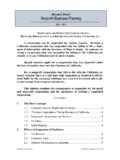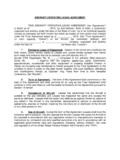Transcription of USING LLCS TO AVOID PROBLEMS AFTER AN OWNER DIES
1 USING llcs TO AVOID PROBLEMS AFTER AN OWNER DIES William C. Staley Attorney 818 936-3490 WARNER CENTER ESTATE AND TAX PLANNING COUNCIL Roundtable Discussion November 2, 2011 William C. Staley 818 936-3490 111311:1744 USING llcs TO AVOID PROBLEMS AFTER AN OWNER DIES TABLE OF CONTENTS Page 1. Intro to Limited Liability Companies .. 1 2. The California Taxes on llcs Just Pay It .. 1 3. Sole Proprietor .. 1 4. Real Property One OWNER or Owned by Husband and Wife .. 2 5. Real Property Several Owners .. 3 6. Family Limited Partnership .. 4 7. Limited Partnership with an LLC as the GP .. 5 8. Protection from the Member s Creditors .. 6 9. Keeping the LLC Property in the Family .. 7 10. The Series LLC .. 8 11. Storm on the Horizon Carried Interest Legislation .. 9 12. Donating Questionable Real Property to a Charity .. 10 13. Bonus from Jacob Stein: DE LLC for Privacy.
2 11 14. Bonus from Bill: A Classic Flip .. 11 Copyright 2011 All rights reserved William C. Staley 818-936-3490 This outline should be viewed only as a summary of the law and not as a substitute for legal or tax consultation in a particular case. Your comments would be appreciated and are invited. 111311:1744 USING llcs TO AVOID PROBLEMS AFTER AN OWNER DIES William C. StaleyAttorney (818) 936-3490 November 2, 2011 1. Intro to Limited Liability Companies1 2. The California Taxes on llcs Just Pay It California imposes on llcs , including single-member llcs , a flat $800 annual tax and a tax on total income (that is, gross receipts) sourced in California. 2 3. Sole Proprietor Use a single-member LLC to prevent an executor, successor trus-tee or distributee from becoming an employer or subject to prod-ucts liability claims.
3 (a) The executor, trustee or distributee becomes the member and appoints the manager. (b) The executor, trustee or distributee does not become the employer or take title to the products. 1 See 2 Cal. Rev. & Tax. Code 17941 (flat tax), 17942 (tax rates on total income ). The current total income tax rates are: Total Income Tax $0-$249,999 $-0- $250,000 -$499,999 $900 $500,000 - $999,999 $2,500 $1 million - less than $5 mill. $6,000 $5 million or more $11,790 Texas and Pennsylvania also impose taxes on llcs . 111311:1744 -2- William C. Staley 818-936-3490 (c) An LLC can, but usually does not, have officers like a corporation. A board of directors and/or a board of advi-sors are also possible, but more rare. A single-member LLC is disregarded for income, estate and gift tax purposes. (a) A single-member LLC is not disregarded for liability pur-poses or for sales or property tax purposes.
4 (b) Any LLC can be classified as a corporation for tax pur-poses, if the member(s) make an affirmative election, but it is rarely done and even more rarely a good idea. The Section 1014 basis step-up is preserved for tangible and most intangible assets of the business, but probably not for goodwill. A single-member LLC should have an operating agreement be-tween the member and the LLC. The agreement states how a successor manager is chosen and who can sign to convey LLC as-sets or to undertake liabilities of the LLC. A single-member LLC usually should be manager-managed, to AVOID a situation in which, AFTER the death of the original member, all heirs have the right to bind the LLC. A single-member LLC is often the ideal entity for a subsidiary of a holding company or an operating company. 4. Real Property One OWNER or Owned by Husband and Wife Use an LLC to prevent an executor, successor trustee or distribu-tee from becoming subject to environmental liability claims.
5 (a) The executor, trustee or distributee becomes the member of the LLC. The member(s) appoint the manager. 111311:1744 -3- William C. Staley 818-936-3490 (b) The executor, trustee or distributee does not appear on title to the property. Preserves the Section 1014 basis adjustment at death. Might provide discounts for estate and gift tax values. Consider California property tax consequences of the transfer to the LLC. (a) The parent-child exemption does not apply to transfers of LLC or partnership interests. (b) The transfer to an LLC or other entity will not trigger a change in ownership IF the indirect ownership interests are exactly the same before and AFTER the transfer. (c) If the above rule is used, then when on a cumulative basis more than 50% of the interests in the entity have been transferred, there will be a change in ownership of the entire property.
6 (d) The above rule does not apply to property bought by the entity. Consider the effect on title insurance held by the property OWNER . 5. Real Property Several Owners Jim, Rick and Steve, three old guys, own a parcel of commercial prop-erty. For decades they have run it just fine as tenants in common. Jim dies and his wife takes his place. That s manageable. Jim s wife dies and their three surviving kids and four adult grandchildren become te-nants in common. All need to sign each lease. No longer manageable. All are subject to environmental liabilities. If Jim, Rick and Steve get the planning itch at the exact same time, they can all put their tenants in common interests in an 111311:1744 -4- William C. Staley 818-936-3490 LLC. The LLC would have three managers, initially Jim, Rick and Steve. The LLC would have three classes of interests J class for Jim, R class for Rick and S class for Steve.
7 So each family would always elect one of three managers. If Jim gets the planning itch before Rick or Steve, Jim can trans-fer his tenancy in common interest into an LLC with one manag-er. That way, one manager will always represent Jim s family, no matter how many family members own interests in the LLC. The successors will not incur environmental liabilities because they will not be on title. Jim gets the itch, Rick and Steve are willing to take baby steps, no more. Jim, Rick and Steve transfer their tenancy in common in-terests to a general partnership. Jim transfers his partnership in-terest to an LLC as in above. At least there is a way to have a bank account for the property and to borrow in an entity s name. Rick and Steve can set up llcs when they get around to it. If they don t their heirs are subject to the same liabilities as if they held tenancy in common interests.
8 Preserves the Section 1014 basis adjustment at death. Might enhance valuation discounts for EGT purposes, while ac-tually making it easier to sell the entire fee interest to one buyer. 6. Family Limited Partnership Mon and Dad owned commercial real property for many years. Even-tually, they set up a family limited partnership and transferred the prop-erty to the FLP. They gave FLP interests to the children. Mom was GP AFTER Dad died. Junior helped her run the FLP. Mom just died. Junior is concerned that stepping in as GP will subject him to environmental and other liabilities. Why should I have to take on these liabilities, but not my siblings? 111311:1744 -5- William C. Staley 818-936-3490 The sibs did not mind when Mom and Dad had an extreme degree of control over the FLP. AFTER all, Mom and Dad originally owned all the partnership interests and the kids did not pay anything for their LP inter-ests.
9 The sibs are not very happy about Junior having all of the discre-tion that Mom and Dad had. They would like to tighten up the agree-ment by reducing the GP s discretion and increasing the GP s accounta-bility to the LPs. It s generally a bad idea to die with an FLP holding real property that might be subject to environmental clean-up obligations. Better to convert the LP into an LLC during the life of Mom. Then Junior can become the successor manager without taking on the unlimited liability of a GP. The conversion from an LP to an LLC is a good opportunity to reduce the manager s discretion and to increase the manager s ac-countability to the members. The conversion should be a non-event for property tax and income tax purposes. The LLC uses the same EIN as the LP did. 7. Limited Partnership with an LLC as the GP It minimize California taxes.
10 But the cost might be too high. It provides limited liability .. IF it s operated properly. A signature block that works: STALEY PROPERTIES, LP By its sole General Partner STALEY MANAGEMENT LLC By Bill Staley, Manager 111311:1744 -6- William C. Staley 818-936-3490 Signature blocks that could make the manager of the GP-LLC, a individual, subject to unlimited personal liability as a general partner: STALEY PROPERTIES, LP By Bill Staley, Manager STALEY PROPERTIES, LP By Bill Staley Bill Staley for Staley Properties, LP Bill Staley, Staley Properties, LP Bottom line: It s easy to lose the liability protection of the limited partnership with an LLC (or corporation) as the sole general part-ner.






